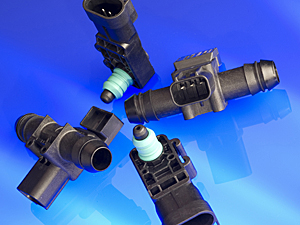May 17 2008
The Robert Bosch GmbH has decided to develop its new fuel tank pressure sensor using BASF’s Ultramid® T KR 4355 G7, a partially aromatic polyamide (PA 6/6T) that fulfills a new and crucial requirement for materials used in electronic housings: today, any material that comes into contact with modern fuels has to be able to resist not only gasoline but also water and alcohols such as methanol and ethanol.
 Bosch fuel tank sensors made from Ultramid® T KR 4355 G7
Bosch fuel tank sensors made from Ultramid® T KR 4355 G7
These substances are found in the tank, especially due to the admixture of biofuel containing alco¬hol. Moreover, the material can withstand the presence of zinc chloride: At the underbody area the sensor may come into contact with this zinc salt, that can be formed at the zinc plated car body due to splash water.
Bosch and BASF, global cooperation
Following studies conducted by Bosch and tests on the ozone resistance carried out at BASF’s applications technology laboratories, Bosch developers chose Ultramid T, a material that is also highly dimensionally stable and that absorbs hardly any water. The participants in this global project included Bosch’s sensor and ignition development departments in Stuttgart-Feuerbach, Germany and in the United States, the central research division in Waiblingen and the production division in Eisenach as well as BASF’s project managers in Germany and in the United States; the project also involved the car manufacturer.
Posted May 14th,2008